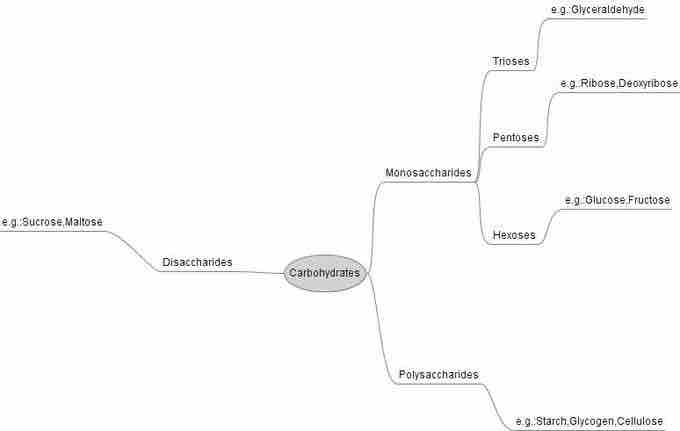Benefits of Carbohydrates
Biological macromolecules are large molecules that are necessary for life and are built from smaller organic molecules. One major class of biological macromolecules are carbohydrates, which are further divided into three subtypes: monosaccharides, disaccharides, and polysaccharides . Carbohydrates are, in fact, an essential part of our diet; grains, fruits, and vegetables are all natural sources of carbohydrates. Importantly, carbohydrates provide energy to the body, particularly through glucose, a simple sugar that is a component of starch and an ingredient in many basic foods.

Carbohydrates
Carbohydrates are biological macromolecules that are further divided into three subtypes: monosaccharides, disaccharides, and polysaccharides. Like all macromolecules, carbohydrates are necessary for life and are built from smaller organic molecules.
Carbohydrates in Nutrition
Carbohydrates have been a controversial topic within the diet world. People trying to lose weight often avoid carbs, and some diets completely forbid carbohydrate consumption, claiming that a low-carb diet helps people to lose weight faster. However, carbohydrates have been an important part of the human diet for thousands of years; artifacts from ancient civilizations show the presence of wheat, rice, and corn in our ancestors' storage areas.
Carbohydrates should be supplemented with proteins, vitamins, and fats to be parts of a well-balanced diet. Calorie-wise, a gram of carbohydrate provides 4.3 Kcal. In comparison, fats provide 9 Kcal/g, a less desirable ratio. Carbohydrates contain soluble and insoluble elements; the insoluble part is known as fiber, which is mostly cellulose. Fiber has many uses; it promotes regular bowel movement by adding bulk, and it regulates the rate of consumption of blood glucose. Fiber also helps to remove excess cholesterol from the body. Fiber binds and attaches to the cholesterol in the small intestine and prevents the cholesterol particles from entering the bloodstream. Then cholesterol exits the body via the feces. Fiber-rich diets also have a protective role in reducing the occurrence of colon cancer. In addition, a meal containing whole grains and vegetables gives a feeling of fullness. As an immediate source of energy, glucose is broken down during the process of cellular respiration, which produces adenosine triphosphate (ATP), the energy currency of the cell. Without the consumption of carbohydrates, the availability of "instant energy" would be reduced. Eliminating carbohydrates from the diet is not the best way to lose weight. A low-calorie diet that is rich in whole grains, fruits, vegetables, and lean meat, together with plenty of exercise and plenty of water, is the more sensible way to lose weight.